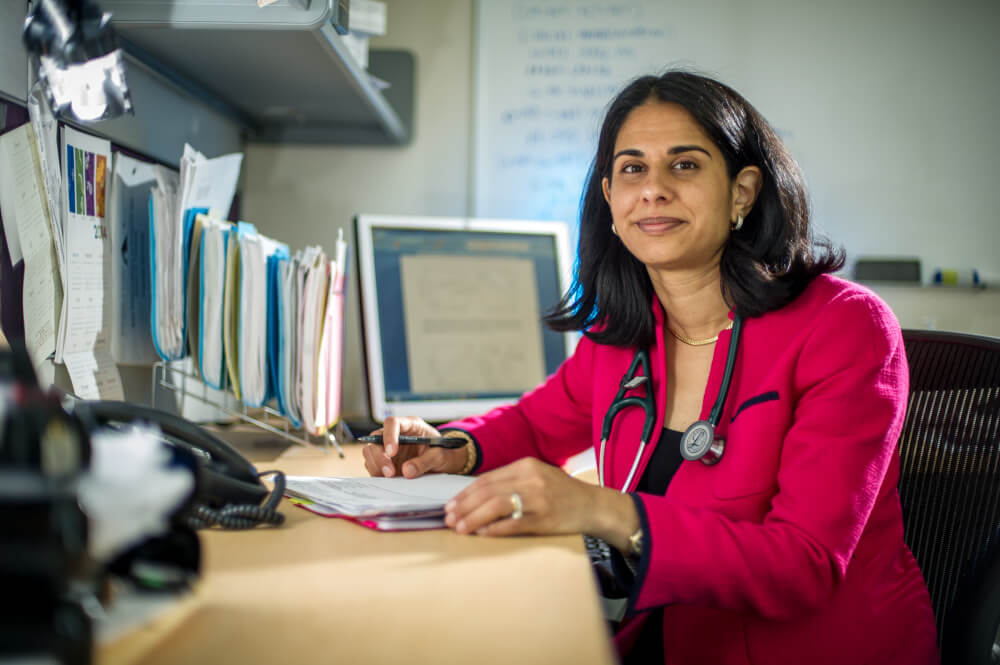Not only are more effective drugs for breast cancer coming to the clinic, but oncologists are making important progress in matching breast cancer treatment to specific patients and the molecular characteristics of their tumors. It’s also becoming more feasible to rachet the intensity of treatment up or down depending on the patient’s risk status, and this may help reduce toxic side effects.
Advances are being seen in all three major forms of breast cancer — estrogen- receptor positive, HER-2 positive, and triple negative cancers.
“We have multiple new agents, and some of these drugs are improving survival,” says Sara Tolaney, MD, MPH, chief, Division of Breast Oncology in the Susan F. Smith Center for Women’s Cancers at Dana-Farber. “I think we have come a long way in individualizing treatment for each patient — not only to the stage and subtype of the cancer but also to patient’s response to prior therapy, as well as the molecular makeup of the tumor cells and state of the patient’s immune system.”

Different forms of breast cancer
Breast cancer is not one disease, but many. In general, there are three main types:
About two out of three breast cancers are hormone-sensitive (or hormone receptor-positive), meaning their growth is fueled by either estrogen or progesterone, and can be treated with therapy that blocks the effect of the hormones on the growth of the cancer cells.
HER2-positive breast tumors, which make up about 20 percent, have too much of a protein that can make cancers grow more quickly and aggressively.
“HER2-positive disease was once thought to have the worst prognosis, but now I might say it is the subtype with possibly the best prognosis because of our HER2-targeted therapies,” says Tolaney.
Triple-negative breast cancers account for 10 to 15 percent of cases. They lack hormone receptors, nor are they HER2-positive. They are more common in women younger than 40, who are Black, or have a BRCA1 gene mutation, and have a worse prognosis because they are aggressive and have limited treatment options.
In estrogen receptor-positive breast cancer, molecular diagnostic testing has helped predict how the cancer will behave: as a result, many with early-stage disease can choose not to have chemotherapy if testing shows the cancer is unlikely to recur. For those with ER-positive cancer that has metastasized, the addition of newer drugs, known as CDK4 and CDK6 inhibitors such as palbociclib and abemaciclib, to endocrine therapy have improved progression-free and overall survival compared to endocrine therapy alone. These drugs are a new standard treatment for hormone receptor positive advanced breast cancer. However, resistance ultimately occurs, leaving researchers with much work to do to find ways of countering resistance.
Major advances in HER2-positive breast cancer
A radical change in treatment of HER2-positive breast cancers was the advent of targeted therapy with a monoclonal antibody, trastuzumab (Herceptin), in 1998, which had a major impact on outcomes, including survival, especially in early-stage disease.
“As we have gotten better at introducing HER2-directed therapies into this setting, we also have the opportunity to figure out how to best personalize therapy for our patients,” Tolaney notes. “This means trying to de-escalate the amount of toxic therapy given to patients with lower-risk disease and trying to escalate therapy for those who have higher-risk disease.”
More recently, drugs that combine an antibody with a chemical toxin have improved outcomes in HER2-positive breast cancers that could not be removed by surgery or had metastasized to other parts of the body, including the brain.
Since 2013, an antibody-toxin conjugate called trastuzumab emtansine (Kadcyla), also known as T-DM1, had been the preferred second-line treatment for metastatic HER2-positive breast cancer. However, a newer conjugate drug, called trastuzumab deruxtecan (Enhertu), or T-DXd, is showing dramatically improved response rates and outcomes to T-DM1 in an ongoing clinical trial called DESTINY-Breast-03. These “unprecedented results” presented last year demonstrated significant progression-free survival in patients with metastatic HER2-positive disease, says Tolaney. The response rate was “extraordinarily high” at 80% and the complete response rate was 16%.
“Really, this makes us wonder what’s going to happen to these patients with longer follow-up,” says Tolaney. “Is it possible that some of these patients could even be cure of their metastatic disease? I think this trial has really made history.”
Triple-negative breast cancer – still a challenge
Triple-negative breast cancer remains a treatment challenge, since the lack of receptors on the cancer cell makes it more difficult to target than hormone receptor-positive or HER2-positive breast cancers. The risk of recurrence for patients who have localized triple-negative breast cancer is higher than for other subtypes of breast cancer.
The old standbys of surgery, chemotherapy, and radiation are used in the treatment of triple-negative cancers. However, there are some indications that recently developed immunotherapy drugs may prove helpful in this disease; triple-negative breast cancer seems to be more responsive to immunotherapy that other forms of breast cancer, and pembrolizumab is an immunotherapy agent that is approved to treat both early and advanced stage triple-negative breast cancer.
Many trials are under way looking at treatments for this challenging disease. One antibody-drug conjugate, sacituzumab govitecan, has shown robust activity in patients who previously received treatment for metastatic triple-negative breast cancer, and several other antibody drug conjugates are in development. Doctors say patients should look into the possibility of joining clinical trials which may help them and help move the research forward.

I adore Dr. Winer and am so grateful to him for his unwavering care of my husband, which is why I am disheartened that no mention was made about male breast cancer.
My husband also was recently treated for male Breast cancer and now metasized to the shoulder.We also are very frustrated that male Breast cancer is hardly ever mentioned. He was treated here in Connecticut and we are trying to bring more awareness to male Breast cancer as well. He has been through chemo double mastectomy radiation and suffering with lymphedema as well. Males suffer as well